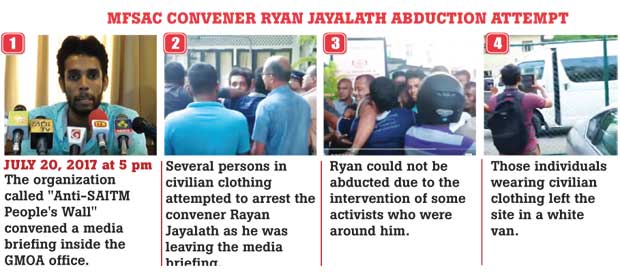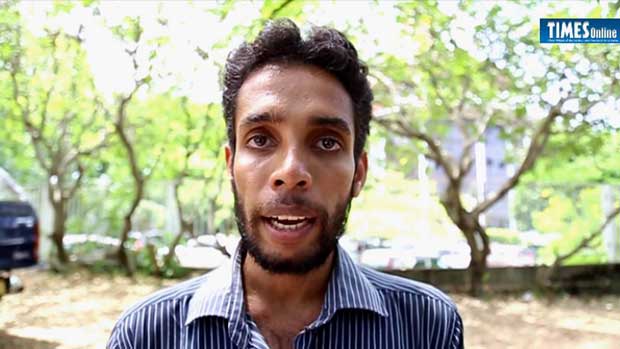Reply To:
Name - Reply Comment
Last Updated : 2024-04-26 20:44:00

"The government should address their genuine grievances, if there are any. However the problem is much of those grievances are a function of shameless self-centred doctors and a dogmatic view on free education held by university students"
In the recent history of this country, repeated failure by successive governments to address proactively incipient threats and peripheral grievances had allowed them to mushroom, which later compelled the beleaguered governments to respond with knee-jerk overly violent means. That happened in 1971, 88-89 and during the rise of Tamil separatism and later terrorism in the early 80s. History is threatening to repeat itself. There are reports of an alleged ‘abduction’ attempt of Medical Faculty Students Action Committee (MFSAC) convener Ryan Jayalath. Activists claim Mr Jayalath, who has five police warrants against him successfully tricked the ‘abductors’ and fellow campaigners preventing officials from arresting another chap who pretended to be Jayalath. Then the would-be abductors had left the scene in a white van.
happened in 1971, 88-89 and during the rise of Tamil separatism and later terrorism in the early 80s. History is threatening to repeat itself. There are reports of an alleged ‘abduction’ attempt of Medical Faculty Students Action Committee (MFSAC) convener Ryan Jayalath. Activists claim Mr Jayalath, who has five police warrants against him successfully tricked the ‘abductors’ and fellow campaigners preventing officials from arresting another chap who pretended to be Jayalath. Then the would-be abductors had left the scene in a white van.
In the first place, Mr Jayalath should not have been subjected to an abduction attempt; instead he should be arrested for absconding court which has issued five arrest warrants on him to date.
Second, the police need not act coy if an arrest attempt was foiled by the other activists who were present there, provided that the arrest was meant to be conducted within the legal remit. Instead, it should file charges against those who obstructed its officers from carrying out their duties.
Third, if the police or any other legal arm of the State, most likely the CID, had acted arbitrarily in the recent blotched arrest of the student activist, then it is a problem. It was this penchant to act extra judicially that resulted in overall de-legitimization of State institutions and gradual brutalization of society. Extra judicial measures rarely pay off. Instead, they galvanize the protesters. If extra judicial means are to be successful, they ought to be escalated well beyond morally acceptable limits, extracting a heavy cost on the social fabric which in effect brutalizes society. Stability achieved through those means, as we did in 1989, is a hollow one.
"Recent strikes and protests have another sinister connotation. They challenge the very legitimacy of the country’s courts. Students are taking to the streets with manifest contempt to court orders banning such protests"
All that happened in the past because then governments failed to address the problems when they could have done so easily – though the intransigence of nihilistic insurgent groups such as the JVP was partly a reason that produced a ruthless State reaction. Sri Lanka would not go along that path again, for there has been a greater deal of empowerment and enlightenment of even the most dispossessed sections of youth thanks to social and economic forces unleashed by free markets and globalization. So there will be fewer foot soldiers for those anarchic campaigns. However, even a few can cause enough social instability and anarchy, clogging up streets in Colombo on weekly protests.
The government should address their genuine grievances, if there are any. However the problem is much of those grievances are a function of shameless self-centred doctors and a dogmatic view on free education held by university students. That would mean there may not be a compromise. Yet the government should implement meaningful recommendations of the Sri Lanka Medical Council such as gazetting the minimum requirements for medical education, which the government is holding back for some unknown reason.
 Ryan Jayalath
Ryan Jayalath
However, streamlining and regulating private medical education in this country would not end these protests, because they are held against the very idea of private education. If the government gives in, they will morph into a larger campaign against all forms of other privately funded higher education and over time to an opposition to economic reform agenda of the government. If the government gives up, as successive Sri Lankan governments have done in the past, it would be the wider Sri Lankan public who would be stripped of their chance for prosperity. Economic transformation in countries at our level of social economic conditions would not happen without causing a certain degree of physical and physiological displacement to some segments of the public. Alberto Fujimori, Peru’s now disgraced former president (whose policies nonetheless helped uplift millions of poor) called them a ‘shock therapy.’ Recent strikes and protests have another sinister connotation. They challenge the very legitimacy of the country’s courts. Students are taking to the streets with manifest contempt to court orders banning such protests. A Satyagraha in the Lipton Circus that was held despite a restraining order by the Court was dispersed yesterday. Doctors are launching strikes despite Court orders restraining such actions. Once certain groups begin to challenge the Court, others will follow suit, leading to gradual de-legitimization of independent institutions. The government’s inability to confront a subversive campaign threatens the very independence of those institutions that are the cornerstones of our democracy. Such challenges should not be tolerated.
"In the first place, Mr Jayalath should not have been subjected to an abduction attempt; instead he should be arrested for absconding court which has issued five arrest warrants on him to date"
If S.B.Dissanayake could be jailed for contempt of court, the same law should be applied evenly to others as well.
Those protests are no longer a peripheral issue. They have become a national problem in the eyes of many Sri Lankans. If the government fails to pacify a rather modest current situation, it is mind boggling to think how it would resolve greater challenges that it would meet in the future on the path to constitutional and economic reforms.
Students who are paid their Mahapola scholarships obstruct public traffic; universities which ought to conduct yearly and semester exams postpone them, effectively giving time and space for protests; doctors whose tax files are often suspect blackmail the government through work stoppages. A proactive and practical government has a lot of strings to pull to end this mayhem, rather than resorting to blotched ‘abductions’

Add comment
Comments will be edited (grammar, spelling and slang) and authorized at the discretion of Daily Mirror online. The website also has the right not to publish selected comments.
Reply To:
Name - Reply Comment
US authorities are currently reviewing the manifest of every cargo aboard MV
On March 26, a couple arriving from Thailand was arrested with 88 live animal
According to villagers from Naula-Moragolla out of 105 families 80 can afford
Is the situation in Sri Lanka so grim that locals harbour hope that they coul